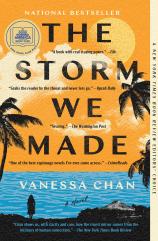The Storm We Made
Review
The Storm We Made
THE STORM WE MADE, Vanessa Chan’s debut novel, is a startling, gripping and electrifying exploration of the British colonization of Malaya and its subsequent Japanese occupation.
It is February 1945, and the teenage boys of Bintang, Kuala Lumpur, are starting to disappear. Cecily Alcantara, a mother of three, has watched for years as her beloved homeland is first colonized by the British (who are domineering yet quiet) and then, in a bid for independence, occupied by the Japanese (who are much more involved than their colonizing peers). But despite revolutions and uprisings, guerrilla attacks and war, she and her family --- Gordon, her husband; Jujube, her serious eldest daughter; Abel, her loping, playful teenage son; and Jasmin, the cheer and whimsy of the family --- have remained safe and stable.
Their safety is further ensured by their skin. Though they’re not the blotchy pink of the British, Cecily and Gordon are of Eurasian descent, and they are able to “pass” between the worlds of the colonized and the colonizers. Until the day 15-year-old Abel doesn’t come home. This would shock any mother; Cecily is fearful, devastated and frantic, but not surprised. After all, she carved the path for Abel’s disappearance 10 years earlier, and the guilt has seen her through ever since.
"THE STORM WE MADE is a sweeping, unflinching portrayal of a country condemned.... This is a stunning achievement of wartime fiction, of Asian culture, and, most of all, of the ways in which war causes us to accept pain as part of existence."
Jumping back to the British occupation, Chan introduces a younger, more privileged Cecily. Gordon, a consummate follower, has secured a good role in the British public works department. While Cecily has no love for her colonizers, she recognizes that Gordon’s devotion at least keeps her family fed, clothed, sheltered and alive. But this doesn’t mean that she can’t --- under her stifling ball gowns, luxurious jewelry and picture-perfect façade of composure --- dream of something more: an independent Malaya, taken as seriously as nations like China and Japan and able to rule and govern itself.
One night, after her husband has passed out drunk, Cecily meets Bingley Chan, an Asian man who, with his British accent, seems to have secured a curious level of respect from the Brits. But Cecily learns that he is no follower. His real name is General Fujiwara, and she finds in him not only a sparkling conversationalist and upper-echelon-friendly confidant, but also an ally. Before long, Cecily is collecting scraps of paper from Gordon’s office, lines of gossip from his parties and hushed whispers from behind the closed doors of her home, and delivering them all to Fujiwara. Together, they plan to confront and toss out the British, making way for the Japanese, whom Fujiwara claims will free Malaya. As Cecily turns from housewife to informant, she discovers both a new level of nationalism she didn’t know she possessed and something even more powerful: a purpose.
But 10 years later, Japan has taken over, boys --- including Abel --- are disappearing, girls are taken from their homes to act as “comfort women,” and citizens like Cecily and Gordon have lost their purpose and pride. No longer at the frontline of the revolution, Cecily takes a backseat as her children become the new voices of invasion and occupation, starting with Abel, who is now living (unbeknownst to his family) in Kanchanaburi Labor Camp on the Thailand border. Abel’s light skin and bright eyes are no longer a sign of privilege, but a target, and he is brutalized in more ways than one by his Japanese captors.
Back at home, Jujube, now a young woman, works in a tea house serving battered soldiers and well-meaning but intrusive missionaries and educators, her only reprieve from her broken home. Unable to dream of a real future, she turns to safeguarding Jasmin, whose innocence both protects her from the horrors of war and puts her at serious risk. She knows nothing of labor camps or comfort women, only that she is forced to shear her hair and hide in the basement whenever soldiers are in town. In a moment of rage, she runs away. Now two of Cecily’s children are missing; her husband, once a proud public figure, has been demoted to hard labor; and Cecily knows it is time to face her role in the turnover from British colonization to Japanese occupation.
THE STORM WE MADE is a sweeping, unflinching portrayal of a country condemned. Vanessa Chan takes great risks in revealing the brutalities and violence of war, and it is obvious that her research into Malaya, an incredibly underexplored setting for wartime fiction, is both meticulous and compassionate. She chronicles truly horrifying moments, yet none of her more tragic scenes are ever voyeuristic or gratuitous. Every scene, piece of dialogue and development has been carefully considered, clearly conveyed and breathtakingly delivered.
This is a stunning achievement of wartime fiction, of Asian culture, and, most of all, of the ways in which war causes us to accept pain as part of existence. The price of innocence --- as Chan so convincingly demonstrates through Jujube, Abel and Jasmin --- is never worth it, and it is even worse when children are forced to pay without ever knowing why. Even more bracing is Cecily’s character arc, in which an act of revolution and liberation becomes a shackle, and the collateral damage of her dreams for more is personified by the abuse of her children.
In writing THE STORM WE MADE, Chan has accomplished many things, one even more laudable than the next: a spellbinding, epic work of historical fiction, and a call to action for readers to expand their World War II reading to other countries and cultures, where the effects of war were no less felt but never truly acknowledged. More from this author is a must!
Reviewed by Rebecca Munro on January 5, 2024
The Storm We Made
- Publication Date: February 11, 2025
- Genres: Fiction, Historical Fiction, Women's Fiction
- Paperback: 368 pages
- Publisher: S&S/Marysue Rucci Books
- ISBN-10: 1668015153
- ISBN-13: 9781668015155




